#Wild Bill Davis
Explore tagged Tumblr posts
Text

1976 - Wild Bill Davis-Eddie Lockjaw Davis Quartet - tournée en France organisée par le label Black and Blue
Wild Bill Davis (org), Eddie Lockjaw Davis (ts), Billy Butler (g), Oliver Jackson (dr)
youtube
#jazz#poster flyer#jazz ads#wild bill davis#eddie lockjaw davis#billy butler#oliver jackson#1976#label#black and blue
12 notes
·
View notes
Text
The Genius of Oliver Nelson: A Trailblazer in Jazz Composition and Arranging
Introduction: Oliver Nelson, a name synonymous with innovative jazz composition and sophisticated arranging, carved out a unique and influential space in the world of jazz. Born ninety-two years ago today on June 4, 1932, in St. Louis, Missouri, Nelson’s legacy encompasses a prolific career as a saxophonist, composer, arranger, and bandleader. His contributions to jazz extend beyond his…

View On WordPress
#Afro/American Sketches#Bill Evans#Columbo#Count Basie#Duke Ellington#Elliott Carter#Eric Dolphy#Erskine Hawkins#Freddie Hubbard#George Tremblay#Ironside#Jazz Composers#Jazz History#Jazz Saxophonists#Louie Bellson#More Blues and the Abstract Truth#Oliver Nelson#Patterns for Improvisation#Paul Chambers#Quincy Jones#Robert Wykes#Roy Haynes#Sound Pieces#The Blues and the Abstract Truth#The Six Million Dollar Man#Wild Bill Davis
5 notes
·
View notes
Text
we don't talk abt these two mentors enough


only had less than five minutes of dialogue each it's like a cameo, but it's my favourite cameos
#the wild robot#dreamworks animation#dreamworks the wild robot#rozzum unit 7134#roz the wild robot#brightbill#longneck#falcon#???WHAT's HIS NAME#OH WAIT I JUST REMEMBERED HE'S THUNDERBOLT#lupita nyong'o#kit connor#bill nighy#<this guy was davy jones and mr knightley and now he's a canadian goose i love that for him#i love how longneck just went: obtained guardianship of the runt that survived = makes him leader of the pack#also like the fact that his right hand was called honkington i like that name#I LOVE LONGNECK WHY HE HAVE TO DIEEE#ving rhames#i heard this falcon's voice and - i LOVE that entire scene he's all tuff but supportive i just love him#the way he went SHOW ME THOSE TEETHS to beautiful~#can't wait to see ving rhames in the next mission impossible too aaah#movies.family
428 notes
·
View notes
Text
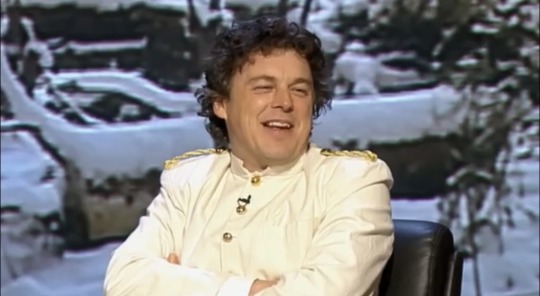
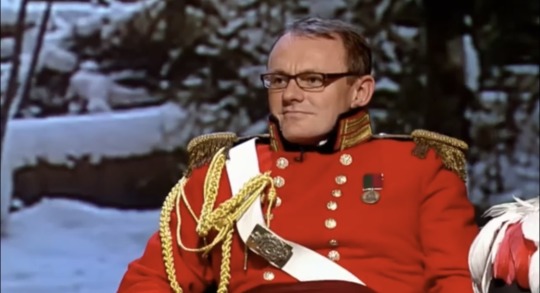


QI series E episode 12: Empire
#these screencaps are so bad#i just love this episode#+ stephen is dressed as oscar wilde in this ep#alan davies#sean lock#jo brand#bill bailey#qi#crazy pigeon
22 notes
·
View notes
Text
Podcast: Speak No Evil & The Wild Robot
Greetings programs! This week on the show, we’re talking about two new-to-home video releases. First up, Speak No Evil is a remake of a 2022 Danish film starring James McAvoy. Then we dive into the world of The Wild Robot, a lovely new film from Dreamworks Animation starring the vocal talents of Lupita Nyong’o, Pedro Pascal, and more! Join us! Continue reading Podcast: Speak No Evil & The…
#Aisling Franciosi#Alix West Lefler#Bill Nighy#Catherine O&039;Hara#Chris Sanders#Dan Hough#James McAvoy#James Watkins#Kit Connor#Lupita Nyong&039;o#Mackenzie Davis#Mark Hamill#Matt Berry#Pedro Pascal#Scoot McNairy#Speak No Evil#Stephanie Hsu#The Wild Robot#Ving Rhames
3 notes
·
View notes
Text
'****
“That was completely nuts!” So exclaims Catherine Tate’s ever-eloquent Donna Temple-Noble during the dizzying climax of ‘The Giggle’, Doctor Who’s third and final 60th anniversary special. In-universe, it’s a perfectly understandable reaction to a particularly wild development involving a high striker hammer and the Doctor’s trusty TARDIS. It also just so happens to be a pretty solid summation of the episode as a whole. Because make no mistake, Russell T. Davies’ Whoniverse-reshaping grand finale — a breathless hour of blockbuster telly that’s thrilling, chilling, heartwarming, and headspinning (and that’s just the Spice Girls needledrop!) — is completely nuts.
If last week’s spaceship-in-a-bottle ep ‘Wild Blue Yonder’ was a masterclass in restraint from RTD, then consider ‘The Giggle’ the showrunner unleashed, swinging for the fences with a story rocking more threads than Ncuti Gatwa’s wardrobe. Kicking off with John Logie Baird’s invention of television in 1925 and one ‘Stooky Bill’ — a real puppet so malevolent it makes Annabelle look like a Squishmallow and acts as the villainous Toymaker’s (Neil Patrick Harris) chosen vessel for global chaos — Davies quickly picks up where ‘Yonder’ left off. In short, ol’ Stooky Bill’s musical giggle — transmitted through every screen across the world — has got into everybody’s heads, convincing them they’re 100% right about everything. Screen-enslaved masses utterly convinced they’re right who won’t take no for an answer? Thank goodness this is science fiction, right?
It’s safe to say RTD’s righteous fury at the current sociopolitical climate is more of a focal point here than in the previous two specials. Within a span of mere minutes, Davies’ satirical set-up ruthlessly apes anti-maskers, anti-vaxxers, alt-media conspiracies, and governmental apathy. Some of it — a man endangering himself and others by needlessly standing in the middle of the road because he believes that’s what his taxes have paid for — is lacerating in its absurd plausibility. Other elements — the decidedly camp, to-camera “No change there, then” when a suspiciously Johnsonian PM blithely asks “Why should I care about you?” — are perhaps a little too on-the-nose for comfort.
The central assertion behind this plot — that the world we live in has unmoored itself from principles of right and wrong in favour of individualist notions of winners and losers — is a potent reminder that this all pours from the same pen responsible for Years & Years and It’s A Sin. An early doors monologue from Tennant’s Doctor on how humanity has never struggled to hate, given from within UNIT’s swish new Avengers Tower-looking HQ is vintage RTD. (The new HQ, combined with return of Jemma Redgrave’s Kate Lethbridge-Stewart and the reintroduction of Bonnie Langford’s classic Who companion Mel do nothing to defuse suggestions a spin-off is imminent.)
Alas, no sooner has the apocalypse-level threat been established than we find the Doctor and Donna hotfooting it back to the TARDIS for a trip to Soho circa 1925 in search of the mysterious giggling noise. Here, the episode pivots into out-and-out horror territory, as the duo enter the domain of Neil Patrick Harris’ alternatingly camp and utterly chilling big bad the Toymaker. A kind of problematic deepcut villain from Who history, here the Toymaker is reimagined anew as a palpable existential threat to the Doctor, a manipulative puppeteer and cosmic game player who renders The Master a barely apprentice-level adversary by comparison.
It’s only really as the Doctor and Donna move through the Toymaker’s Gothically manifested dimension — an exquisitely designed realm of dank hotel corridors, pupaphobe-triggering marionettes, and creepy carny puppet shows — that ‘The Giggle’ pauses to catch its breath. It’s in these moments director Chanya Button lets Davies’s otherwise relentless script breathe, augmenting the specials’ ongoing conversation with the show’s own legacy. It’s here that the Doctor is brutally confronted with his past companions’ fates, and it is here that his increasingly fraught sense of self (“Without the TARDIS, without the sonic, without the Time Lord, what am I?”) is interrogated by the God-like Toymaker. “I made a jigsaw out of your history,” Harris’ Toymaker teases, referencing and then discarding the Whoniverse canon’s more outré recent revelations with outlandish ease. It’s a fascinating way to put a pin in the Timeless Child and Flux of it all, Davies simply suggesting that “The Canon” is just one great game.
Speaking of games, mere moments later, the trio — the Doctor, Donna, and the Toymaker — find themselves back in 2023, the elemental ne’er-do-well turning soldiers into balloons while dancing to ‘Spice Up Your Life’. It’s a particularly bananas tonal shift in an episode filled with them, and one that leads the Toymaker and the Doctor directly into their final game.
Without getting into the specifics of it all, if you’re reading this then you likely know that Ncuti Gatwa’s Fifteenth Doctor makes an earlier introduction than many would’ve expected in this finale. That said introduction involves the newest custodian of the TARDIS playing a universe-stakes game of literal catch, in his underpants, and he still manages to arrive on the scene as a force of wit, warmth, sass, and spunk tells you all you need to know about how much of a treat we’re in for come Christmas Day. As the dramatic peak of a 60th anniversary celebration, Y-front-clad ball games (steady!) really shouldn’t work. It is, of course, ludicrous, But it’s also such a uniquely, singularly Who thing to do that it plays out as if it simply couldn’t have been anything else. Gatwa’s arrival within that pivotal moment of transition — for the show and for Tennant’s Fourteenth Doctor — is sensational, the actor’s unique Scottish-Rwandan brogue and hopeful energy sparking a multitude of possibilities for just who the next Doctor will be. Instantly though, he feels *right*.
Now, the discourse will indubitably rage on about the ramifications of ‘The Giggle’s canon-busting denouement. Is it a damning indictment of modern franchises and fandom’s refusal to let things go? Or is it more simply a sincerely delivered reminder that — after years spent running on fumes in a universe gone mad — we’re all just a little bit burnt out, all desperately in need of nothing more than to sit and be with the ones we love for a while? The answer is probably, ultimately, somewhere in between. But of one thing we can be sure. RTD’s final salvo for Who’s 60th celebrations offers — in construction, writing, performance, and execution — a blessedly uncynical and sadly increasingly rare thing; a truly happy ending. That Tennant and Tate — who both finish their run here on a real high, as sarky and in-step with one another as ever — get to go out smiling, ending the show’s ongoing accumulation of trauma across NuWho, is a real balm for the soul.
Overall, ‘The Giggle’ — and by extension these three specials as a collective — successfully act as a heartfelt paean to the messiness and madness of making and watching Doctor Who. They provide a graceful rehabilitation of the show’s recent history, reflect poignantly on Who’s enduring cross-generational appeal, and yet still somehow manage to smoothly clear the field for Ncuti Gatwa’s run as the Doctor. Occasionally they’re a tad unwieldy, with so many ideas that some struggle to breathe as RTD has his cake, eats it, and then duplicates it before going back for seconds. That’s never more apparent than here in this filled-to-bursting finale. But at the same time, they’re also a promise. A promise to embrace the new, to make Doctor Who fun again, and to regenerate the show with enough love coursing through its veins to fill two hearts, to power two TARDISes. And to that we can only really say, one last time, “ALLONS-Y!”
A messy, madcap, yet ultimately fitting finale to Who’s 60th anniversary celebrations, ‘The Giggle’ marks David Tennant’s departure from — and Ncuti Gatwa’s arrival in — the TARDIS with real flair.'
#David Tennant#Ncuti Gatwa#Catherine Tate#Donna Noble#Chanya Button#Russell T. Davies#Doctor Who#60th Anniversary#The Giggle#Neil Patrick Harris#The Toymaker#Spice Girls#Wild Blue Yonder#Stooky Bill#John Logie Baird#TARDIS#Years & Years#It's A Sin#Jemma Redgrave#Kate Stewart#UNIT#Bonnie Langford#Melanie Bush#The Timeless Child#The Flux#Spice Up Your Life#Bi-generation
3 notes
·
View notes
Text
as much as I love local dead people from the 1770s, im currently really feeling a great deal of love for the local dead people of the 1890s and 1900s who looked at all these miscellaneous handwritten papers from the 1770s and went "we should probably transcribe these and put them into books"
thanks to whoever u were at the municipal office in 1900 who saved such gems in "A volume of records relating to the early history of Boston" as a hilariously informal census of who owned cows and how many in the city in 1774

#messages from the ouija board#sadies day job#it might be bc its a month after the port bill and they... might need to know... who owns the cows?#idk someone who knows more about cow censuses please lmk#but i love the names! I love the inconsistencies wrt who is firstname lastname and who is title lastname#and who is title firstname lastname and then Mr Greenough Sail Maker#like why is dr thomas young listed as 'doctor young' but dr peter roberts is 'peter roberts'#and also i love the wild mispelling of amasa davis's name#im so nosy that these kinds of censes and inventories are my favorite thing#it makes me feel like im going through an estate sale lookinh at what people owned
1 note
·
View note
Text
youtube
Some veteran musicians' 90's were so successful we forgot about their sadness. For instance, Sting worked through his issues on The Soul Cages, but the record still felt shinily 90's. Then again, Sting seemed to be one of the musicians best poised for the 90's. He and Peter Gabriel basically made the 90's in the 80's. Think about that – most of their work from the latter would've fit the former with some adjustments. Thus, the 90's caught up with what they were doing. Of course, a question remains how Sting felt about that. He continued to be his prickly self and The Soul Cages did nothing to alter that perception, yet would he be willing to entertain a major change of his persona even under his own rules? Who can tell?
#Youtube#sting#the soul cages#the wild wild sea#kenny kirkland#davis sancious#dominic miller#manu katché#skip burney#ray cooper#munyungo jackson#vinx de'jon parrette#bill summers#tony vacca#brandford marsalis#paola paparelle#kathryn tickell#hugh padgham#90's music#rock
0 notes
Text
Wild West Wednesday - Wild Bill Hickok and Gambler Davis Tutt Engaged in First Recorded Gunfight in the Old West
Image: Wild Bill Hickok threatens the friends of Davis Tutt after defeating Tutt in a duel. Harper’s New Monthly Magazine, February 1867. (Public Domain) On July 21, 1865, Wild Bill Hickok and gambler Davis Tutt engaged in a gunfight in the town square of Springfield, Missouri. It is the first time in the recorded history of the Old West that a one-on-one pistol quick-draw duel took place in…
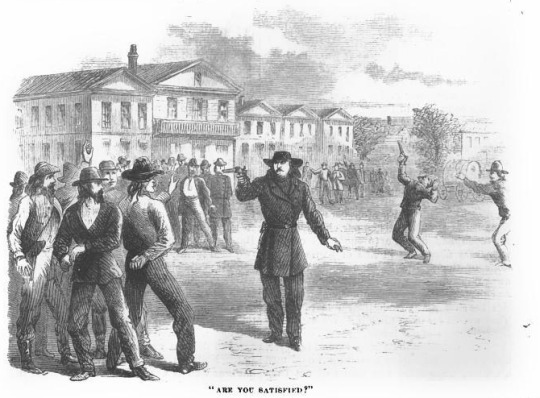
View On WordPress
1 note
·
View note
Text
House Election 2024
In the House Republican have a majority of just 4 seats, flip 4 seats and Democrats get a majority and can pass things like national abortion rights, voting rights, bills on student loan debt and medical debt and much more. So here's a list of the key races for control of the House, so look up your district and find a way to get involved.
Find your House District
Alabama
Shomari Figures (AL-02) Flip
Alaska
Mary Peltola (AK-AL) Hold
Arizona
Amish Shah (AZ-01) Flip
Kirsten Engel (AZ-06) Flip
California
Jessica Morse (CA-03) Flip
Josh Harder (CA-09) Hold
Adam Gray (CA-13) Flip
Rudy Salas (CA-22) Flip
George Whitesides (CA-27) Flip
Joe Kerr (CA-40) Flip
Will Rollins (CA-41) Flip
Derek Tran (CA-45) Flip
Dave Min (CA-47) Hold
Mike Levin (CA-49) Hold
Colorado
Adam Frisch (CO-03) Flip
Yadira Caraveo (CO-08) Hold
Connecticut
Jahana Hayes (CT-05) Hold
Florida
Darren Soto (FL-09) Hold
Whitney Fox (FL-13) Flip
Jared Moskowitz (FL-23) Hold
Illinois
Nikki Budzinski (IL-13) Hold
Eric Sorensen (IL-17) Hold
Indiana
Frank Mrvan (IN-01) Hold
Iowa
Christina Bohannan (IA-01) Flip
Lanon Baccam (IA-03) Flip
Kansas
Sharice Davids (KS-03) Hold
Maine
Jared Golden (ME-02) Hold
Maryland
April McClain-Delaney (MD-06) Hold
Michigan
Hillary Scholten (MI-03) Hold
Curtis Hertel (MI-07) Hold
Kristen McDonald Rivet (MI-08) Hold
Carl Marlinga (MI-10) Flip
Minnesota
Angie Craig (MN-02) Hold
Montana
Monica Tranel (MT-01) Flip
Nebraska
Tony Vargas (NE-02) Flip
Nevada
Dina Titus (NV-01) Hold
Susie Lee (NV-03) Hold
Steven Horsford (NV-04) Hold
New Hampshire
Chris Pappas (NH-01) Hold
New Jersey
Sue Altman (NJ-07) Flip
New Mexico
Gabe Vasquez (NM-02) Hold
New York
John Avlon (NY-01) Flip
Tom Suozzi (NY-03) Hold
Laura Gillen (NY-04) Flip
Mondaire Jones (NY-17) Flip
Pat Ryan (NY-18) Hold
Josh Riley (NY-19) Flip
John Mannion (NY-22) Flip
North Carolina
Don Davis (NC-01) Hold
Ohio
Greg Landsman (OH-01) Hold
Marcy Kaptur (OH-09) Hold
Emilia Sykes (OH-13) Hold
Oregon
Val Hoyle (OR-04) Hold
Janelle Bynum (OR-05) Flip
Andrea Salinas (OR-06) Hold
Pennsylvania
Ashley Ehasz (PA-01) Flip
Susan Wild (PA-07) Hold
Matt Cartwright (PA-08) Hold
Janelle Stelson (PA-10) Flip
Chris Deluzio (PA-17) Hold
Texas
Michelle Vallejo (TX-15) Flip
Henry Cuellar (TX-28) Hold
Vicente Gonzalez (TX-34) Hold
Virginia
Missy Cotter Smasal (VA-02) Flip
Eugene Vindman (VA-07) Hold
Washington
Marie Gluesenkamp Perez (WA-03) Hold
Kim Schrier (WA-08) Hold
Wisconsin
Peter Barca (WI-01) Flip
Rebecca Cooke (WI-03) Flip
If you live in any of these congressional districts (or close to them) you absolutely must sign up to volunteer and help! you! yes you! get to decide what America looks like in 2025, is it gonna be Project 2025 and Trump? or Kamala Harris, Tim Walz and the Democrats protecting your right to control your own body, taking action on the climate and making life more affordable? its up to each of us to do all we can to get to the country we want.
#election 2024#vote#voting#american politics#us politics#politics#political#Democrats#2024 elections
918 notes
·
View notes
Text

1991 concert tour (France ?) - Wild Bill Davis & Harold Ashby - Jazz on the Line - Black and Blue Records
Wild Bill Davis (org), Harold Ashby (ts), Vinnie Johnson (dr)
3 notes
·
View notes
Text
George Freeman: The Jazz Guitar Maestro
Introduction: George Freeman, a name synonymous with mastery and innovation in jazz guitar, has left an indelible mark on the world of music. With a career spanning over six decades, Freeman has captivated audiences with his unique blend of blues, bebop, and soulful melodies. In this blog post, we will explore the life, music, and legacy of George Freeman, highlighting his contributions to jazz…

View On WordPress
#Bruz Freeman#Buddy Rich#Charlie Parker#Christian McBride#Clifford Jordan#Dinah Washington#Earl Hines#Fats Waller#Gene Ammons#George Freeman#Jackie Wilson#Jazz Guitarists#Jazz History#Jimmy McGriff#Johnny Griffin#Kurt Elling#Louis Armstrong#Richard "Groove" Holmes#Sil Austin#T-Bone Walker#Von Freeman#Wild Bill Davis
1 note
·
View note
Text




Betty Davis photographed by Fin Costello, 1976.
"When I got back to New York, I went into the studio in May to complete the 'Miles in the sky' album with Herbie, Wayne, Ron, and Tony. In June, after we had finished 'Miles in the Sky', we went into the studio to began the 'Filles de Kilimanjaro' album. Then we went on tour all summer and finished the album later in September."
"Things weren't going too well with me and Cecily (Tyson), and we broke up because I met this beautiful young singer and songwriter named Betty Mabry, whose picture is on the cover of 'Filles de Kilimanjaro'. We also had a song on there named for her, 'Mademoiselle Mabry'. Man I was really in love again and fell really good about Betty. She was twenty-three when I met her and was from Pittsburgh. My divorce from Frances had come through in February of 1968, and so Betty and I were married that September while the group was playing a gig at the Plugged Nickel. We got married in Gary, Indiana, and my brother and sister stood for me."
"Betty was a big influence on my personal life as well as my musical life. She introduced me to the music of Jimi Hendrix and to Jimi Hendrix himself and other black rock music and musicians. She knew Sly Stone and all those guys, and she was great herself. If Betty were singing today, she'd be something like Madonna: Something like Prince but only as a woman. She was the beginning of all that when she was singing as Betty. She was just ahead of her time. She also helped me change the way I was dressing. The marriage only lasted about a year, but that year was full of new things and surprises and helped me point the way I was to go, both in music and in some ways, my lifestyle."
"The music I was really listening to in 1968 was James Brown, the great guitar player Jimi Hendrix, and a new group who had just come out with the hit record, "Dance to the music," Sly and The Family Stone, led by Sly Stewart from San Francisco. The shit he was doing was badder than a motherfucker, had all kinds of funky shit up in it. But it was Jimi Hendrix that I first got into when Betty Mabry turned me on to him. I first met Jimi when his manager called up and wanted me to introduce him to the way I was playing and putting music together. Jimi liked what I had done on 'Kind Of Blue' and some other stuff and wanted to add more jazz elements to what he was doing. He liked the way Coltrane played with all those sheets of sound, and he played the guitar in a similar way. Plus, he said he heard the guitar voicing that I used in the way I played the trumpet. So we started getting together. Betty really liked this music, and later, I found out she liked him physically too, and he started to come around."
"See, Betty was too young and wild for the things I expected from a woman. I was used to a cool, hip, elegant woman like Frances or Cicely. Who could handle herself in all kinds of situations. But Betty was a free spirited-talented as a motherfucker who was a rocker and street woman who was used to another kind of thing. She was raunchy and all of that kind of shit, all sex, but I didn't know that when I met her and if I did, I guess, I didn't pay attention. But that was the kind of shit she would do, and with the other stuff she was doing, I just got tired of it. "
"After we left Bill and Camille, I went to London to see Sammy Davis Jr., who was over there opening up in Golden Boy. I also saw Paul Bobeson; I tried to see him whenever I went to London until he came back to the States. I was hanging out with people who had a lot of class, but Betty wasn't comfortable around those kinds of people. She only liked rockers, and that's cool, but I always had a lot of good friends who weren't musicians, and Betty couldn't deal with those kinds of people, and we were just moving away from each other."
"Later on in New York, I ran into this beautiful Spanish girl who wanted to go to bed with me. I go over to her place, and she tells me that Betty is going with her boyfriend. When I asked her who he and she told me, "Jimi Hendrix." She was a blonde, fine motherfucker. So she takes off her clothes and she has a body that just wouldn't wait. I tell her. "If Betty wants to fuck Jimi Hendrix. That's their thing, and I ain't got nothing to do with that, and it ain't got nothing to do with me, either." She tells me if Betty was going to be fucking her man, then she was going to fuck me. I tell her, "It don't go like that, because I don't fuck anybody for reasons like that. If you're going to fuck me, then you got to want to do it because you want to do it, not because Betty is fucking Jimi." She put her clothes on and we talked. Man, that shit I told her just fucked her up. Because she was so fine that she was used to men just falling down over themselves to get her. Just because a woman is fine don't mean nothing to me and never did; I've always had fine women. For me to really get into them, they also have to have a mind and think about something other than how fine they are."
"After that, my relationship with Betty just went downhill. After I told her what I knew and her and Jimi asked her for a divorce- I told her I was getting a divorce. She said, "Naw, you ain't either, fine as I am, you know you don't want to give up this good thing!"Oh yeah? Well, bitch, I'm divorcing you, and I already got the papers made out so you'd better sign them if you know what's good for your ass!" She did, and that was the end of that." -From Miles Davis' autobiography.
60 notes
·
View notes
Text
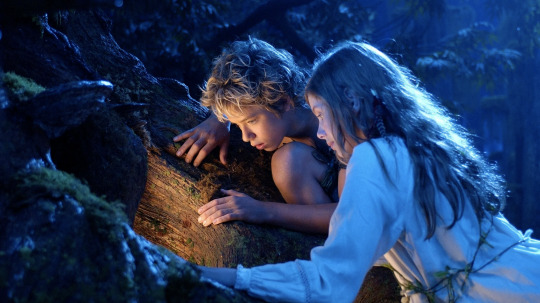
P.J.Hogan's 'Peter Pan' is still an underrated masterpiece 20 years later
Peter Pan is a live-action fantasy adventure film directed by P. J. Hogan that reimagines the classic story of Peter and Wendy. The screenplay was written by P. J. Hogan and Michael Goldenberg and was released in cinemas in December 2003. The screenplay is based on the 1904 play Peter Pan, or The Boy Who Wouldn’t Grow Upand the classic novel Peter Pan by J.M.Barrie, which was originally published under the title Peter and Wendy.
The film tells the story of a young Edwardian girl, Wendy Darling (Rachel Hurd-Wood) and her two younger brothers John and Michael. On the night she is told she must grow up, a wild, fairy-like boy called Peter Pan (Jeremy Sumpter) flies into her room with his high-maintenance fairy Tinkerbell. When he learns that she tells stories, he whisks Wendy and her two brothers away to a magical Island called Neverland — where you supposedly don’t “grow up” — so that she can mother his henchmen, the Lost Boys. There she fights pirates led by the evil Captain Hook (Jason Isaacs), meets mermaids, dances with fairies, falls in love and grows up.

I have strong family connections tied to Peter and Wendy and J.M.Barrie. My great, great uncle Nico was one of the sons of Sylvia Llewelyn Davies'. He and his other brothers "the Lost Boys" were adopted by J.M.Barrie; which ultimately inspired him to write Peter Pan. Nico’s daughter Laura — my cousin — who I met for the first time a few years ago, told me that she was flown to Australia for the filming of P.J. Hogan’s Peter Pan because she was J.M.Barrie’s goddaughter. She told me that she was thrilled with the cast, especially Jason Isaacs, who played Captain Hook and Mr Darling. She also mentioned that Jeremy Sumpter, who played Peter Pan, was a lovely boy. However, she said she was very surprised and sad that the film wasn’t a big success as she really liked what they did with the story. I have loved the fairytale of Peter Pan from a young age, and learning that I am literally part of the family that inspired the story was very exciting and I’ve only begun to internalise it more as I’ve grown older.
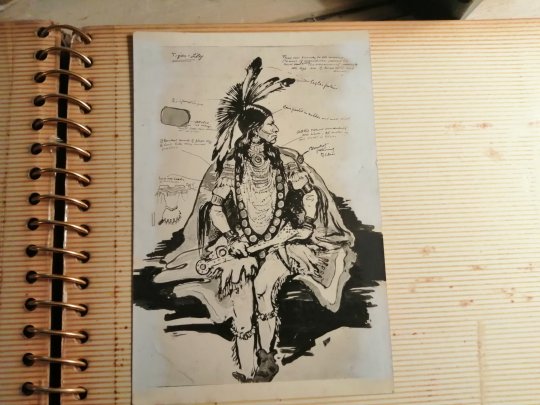
When I was in my mid-twenties, I was diagnosed with a high level of Autism. One of my main symptoms was labelled “ageless”, which in simple terms means that one half of me is still a child that I can’t mentally leave behind. I can’t do many things that most adults can do, such as pay bills, drive a car, look after my own well being etc. I flap my hands when I get excited. I bounce. I sometimes speak in a baby voice. I overcommit to things I enjoy. I admit that it was hard to come to terms with the diagnosis when I first received it. But over time, I’ve come to believe that the two can coexist in a healthy way. I believe that I am an adult who is able to develop and grow while still carrying the child within me, and that this is not seen as a bad thing. I think Peter and Wendy can be seen as a reflection of that.

I was first introduced to P.J. Hogan’s Peter Pan a few years after it was released (I was maybe nine or ten years old), and I absolutely loved it. It wasn’t only one of my favourite film adaptations, but one of my favourite movies of all time. What surprised me most about the film at that age was how dark and gruesome it was, and full of this underlying sexual tension that I hadn’t expected at all from Peter Pan. Even today, this film still has a special place in my heart. It is made with so much passion and love for the original text that I can automatically put myself back into the story. After watching the film again as an adult, I almost immediately opened my copy of Peter and Wendy and started reading. I would even go so far as to say that I prefer the film to the book. However, part of me wishes that the age rating had been set much higher, as the dark and gruesome moments were some of the strongest parts of the film adaptation. This is possibly why some critics and viewers had difficulty categorising the film at the time.
However, I often consider P.J.Hogan’s Peter Pan to be the same equivalent as Joe Wright’s Pride and Prejudice. (which came out a few years later in 2005, starring Keira Knightley and Matthew Macfadyen). The film moves at the same dreamlike pace. It is light, dark, colourful and deeply romantic.

I also often prefer P.J.Hogan’s Peter Pan to the 1953 Disney Animation of the same name, even though it’s the version I grew up with and liked. I find it much less straightforward and innocent. Also, the 2003 film is much closer to the original source material, which I loved reading as a teenager, and to J.M.Barrie’s original vision. The film manages to reflect the same intellectual subtext and depth of the novel while retaining the whimsy and magic.
Magical Realism

Peter Pan was a perfect blend of fantasy and realism. A lot of media these days focus too much on “realism” and make their sets and CGI look bland and washed out. It’s a common myth these days that no one likes whimsy anymore; it’s somehow seen as too childish. As a result, much of the magic of fantasy is lost. But in this Peter Pan, a lot of colour was used in the set design and cinematography. Everything was so brightly and colourfully lit. Most fantasy films these days, including the new live-action adaptation of Peter Pan and Wendy on Disney+, are all so gloomy and dark. You almost have to light up the screen to make out the actors’ facial expressions or what’s happening in the scene. But this film understands that a viewer who watches fantasy wants to be swept away, but also wants a certain amount of believability. Although the film contained a good amount of darkness, it did not shy away from being cartoonish either (which I think was partly inspired by the Disney animation), i.e. characters blushing or bouncing on the clouds.
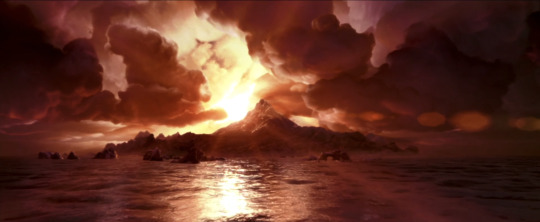
The design of Neverland was breathtaking. I think the CGI, although criticised by some, made the island and creatures look more dreamy and fairytale-like. It was a good combination of CGI for the landscapes and real backdrops for the jungle, so there was enough magic and believability to transport the viewer into the story. A bright colour palette was used for the landscapes, while down-to-earth colours such as browns and greens were used on the ground, such as in “The Lost Boys Hide” under the tree, to give a sense of realism. The costume department also reflected this, from the majestic reds and blacks of the pirates, to the earthly colours of blue and red for the Native Americans, to the natural greens and browns of the Lost boys. I noticed that the colours in Neverland were used as a contrast to the Edwardian London back home, which is realistic but dull compared to the island.
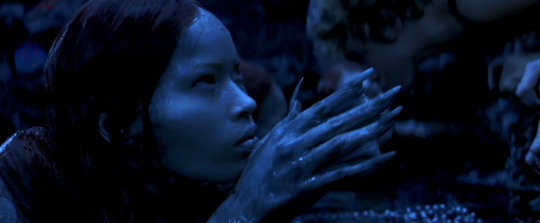
One aspect I liked was that the lighting on Neverland always changed depending on the mood of the scene- unlike the naturalistic lighting on Earth. It was almost as if the island was a living being. For example, when there was a fight on the ship, the lighting was red. When Peter took Wendy to the mermaids, who were scary and frightening, the lighting was dark and blue. This created a surrealistic atmosphere, almost like a fever dream or a kind of nightmare.
Sometimes the environment changed depending on Peter Pan’s mood in the respective scene. I particularly liked how Peter Pan influenced the weather on Neverland. Just his mere presence when he flew to the island changed the entire atmosphere in an instant. His feelings also determined whether it was summer or winter. In other words, its suggested in the film that the longer he has been there, the more the island has become a part of him, so that he can no longer leave it. It’s almost as if the island has transformed him into a magical being.
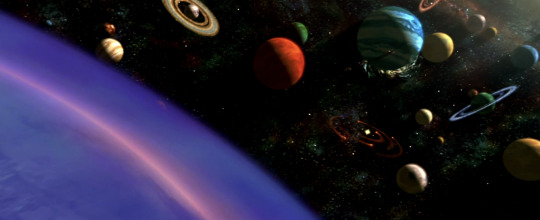
The exuberant musical score by James Newton Howard: I’ll never forget that. I think that was one of the first movies I saw where I actively noticed the music because it was so brilliant. Even today, the “Flying” soundtrack still gives me goosebumps. It perfectly encapsulates the whimsy, joy and imagination of Peter and Wendy. I loved that there were always different variations. One of my favourite pieces from the movie is ‘Fairy Dance’, which starts off cheerfully and moves up and down depending on the characters’ conflict/what they’re saying in the scene.
Cast
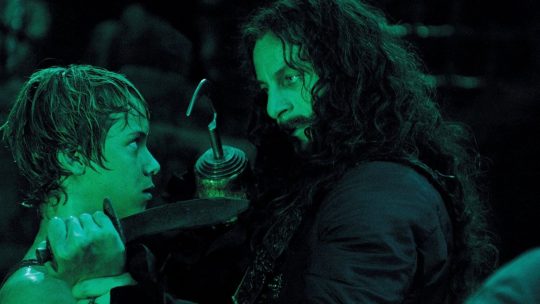
The cast of this film adaptation was magnificent. The look of all the actors not only matched the book description, but also the mood, especially with the Darling family. One of the standouts was Olivia Williams as Mrs Darling. She captured the gentleness of the character perfectly. I also loved the new addition of Aunt Millicent, played by Lynn Redgrave. She fitted into the story so well that I was surprised not to find her in the novel. She had the perfect amount of ridiculousness and hilarity that suited J.M.Barrie’s style.
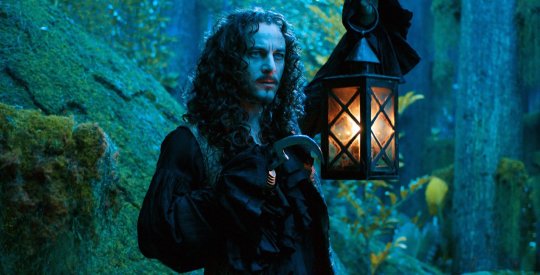
One particular member of the cast we can probably all agree on that was perfect, was Jason Isaacs, who played both Wendy’s father Mr Darling and Captain Hook. He was certainly a star in this film for sure. I just can not think of anyone who could play him better, especially in a live-action film adaptation. He was particularly good in the role of Captain Hook. When I first saw the film as a child, I did not know that Captain Hook and Mr Darling were played by the same person until my dad pointed it out to me because he was so good. I loved how they portrayed Wendy’s dad as shy and reserved, as opposed to Captain Hook who was flamboyant and sinister. Mirror versions of each other in different realities — that’s a common theme throughout the film. As Captain Hook, Jason Isaacs perfectly captured the essence of viciousness, deviousness and brutality that was necessary for the character. But also the deep loneliness and frustration behind it all. I have seen a quote that was supposedly cut from the film (and never should have been) that provides so much context for his hatred of Peter Pan:
“Imagine a lion in a cage and into that cage flies a butterfly. If the lion was free, it would pay no heed to such creature. But the lion is not free…and so the butterfly drives him slowly insane.” — Captain Hook
They did a really good job of showing how Peter Pan and Captain Hook are mirror images of each other. Peter Pan is a child who secretly wants to be an adult, while Captain Hook is an adult who secretly wants to be a child. Both fight each other for different reasons, but the goal is the same. For example, there is a great scene towards the end where Captain Hook uses his wits to defeat Peter in a fight. Here it becomes clear that there is deep symbolism for the inevitability of adulthood and the loss of childhood. Jason Isaacs really showed off his acting talent here. I liked that he wasn’t portrayed as a “dumb villain”, which he easily could have been.
There were also some great performances among the adults. Most notable was Richard Briers as the ‘pirate’’ Smee. But the child actors, especially the lost boys, really held the movie together. Their solid performances made it so believable that the island was ruled by children. I loved Theodore Chester as Slightly. He was very charming and funny in that role.
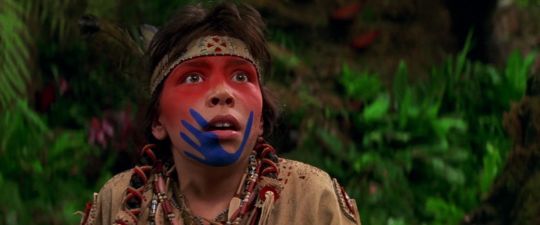
Another member of the cast I thought was brilliant was Carsen Grey, an indigenous actress of Haida descent, who played Princess Tiger Lily. I liked that they let her speak her ancestral language, Mohican, in this film. Although this film came out in the early 2000s, it is the only version of Peter and Wendy in which Native Americans are neither erased nor white-washed even though the representation is far from great. Considering how they’re treated in the novel, it’s perhaps for the best overall that they limited some of their scenes. However, I liked how firey she was in this adaptation and not the damsel in distress she was portrayed as in the Disney animation. I think it was a wise decision to cut the infatuation she had with Peter Pan, as it was really just one line in the book that would have added unnecessary drama, and all in all, it would have fallen short if all the female characters were jealous of each other.
They also downplayed Tinkerbell’s jealousy in this regard, portraying it more as her trying to protect Peter Pan’s youth from romantic advances, as hinted at in the novel, and also being sad that Wendy is attracting all of Peter Pan’s attention. Ludivine Sagnier has, in my opinion, succeeded well in making Tinkerbell equally repulsive and endearing, as befits the character.
Wendy Darling
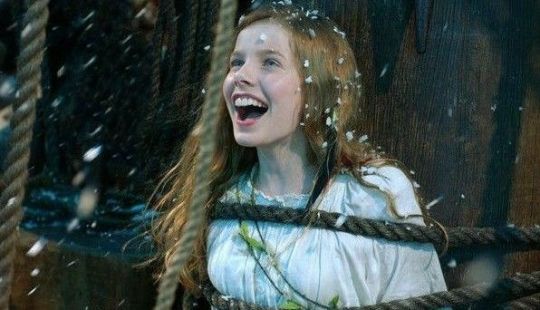
Rachel Hurd-Wood was the perfect cast for the role of Wendy Darling.I was actually surprised to learn that this was her first film role ever, because she was a natural. She effortlessly possessed the same caring nature and charm that makes Wendy so endearing. She is exactly how I imagine the character when I read the story. When people talk about Peter and Wendy, they always mention Tinkerbell, Pan or Hook, but personally I am always drawn to Wendy. She is the real heroine of the story. After all, she was the main reason for Peter to bring her and her brothers to Neverland.
What always amazes me about Wendy’s role in the story is the fact that Wendy literally doesn’t spend much time being a “child” in the time she spends in Neverland. When she’s not escaping death at the hands of mermaids or pirates, she acts as a mother to the ‘lost boys’ and her brothers. She asks herself what she really wants from life. In comparison, she was allowed to behave more like a child at home in Edwardian London. Neverland is not a place where you never grow up. It’s the place where she chooses to grow up. Many people have described Neverland as a manifestation of Wendy’s subconscious as a result of trauma, and I’ve never found that to be more true in this adaptation.
One of the reasons why I think P.J. Hogan’s Peter Pan is the best adaptation of the novel is the fact that the film revolves around Wendy’s coming of age. I loved that they expanded on her love of storytelling and also gave her a tomboyish streak. Instead of just being on the sidelines, she’s able to get involved and fight pirates while retaining many of her feminine traits such as her maternal instincts and romantic feelings for Peter. She makes mistakes and sometimes gets dragged into things she knows she shouldn’t do. But in the end, she triumphs.
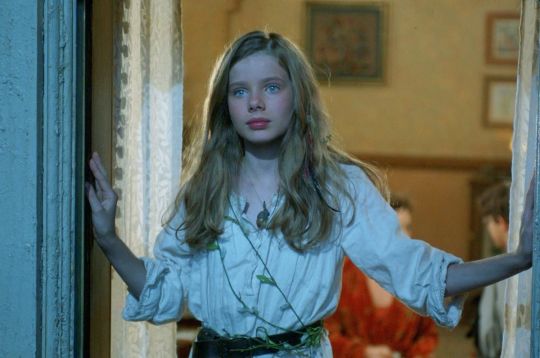
In many film adaptations of Peter and Wendy that I have seen, Wendy is either only present in passing or not at all. Characters like Peter Pan, Captain Hook and Tinkerbell always take centre stage, which I think is a strange decision as they are part of Wendy’s story and not the other way around. Peter Pan is meant to metaphorically represent the childhood she does not want to give up (which is why the character is always played by a woman in the original play, as he is a mirror image of Wendy). And Captain Hook (J.M.Barrie also wanted him to be played by the same actor as Mr Darling) represents the dark side of her father, or rather what she imagines adulthood to be. This is particularly emphasised in this film adaptation because he is an important factor in her being told to grow up. The father, the concept of adulthood, and Peter Pan, her childhood, are at constant war with each other.
“You’re not supposed to be like Peter, who kept every good and bad aspect of being a child and can’t tell right from wrong. You’re not supposed to be Hook, either. He let go of everything childish and loving about him and became bitter and evil..You’re supposed to fall in the middle, to hold onto the things about childhood that make it beautiful — the wonder, the imagination, the innocence — while still growing up and learning morality and responsibility. You’re not supposed to be Hook. You’re not supposed to be Peter Pan. You’re supposed to be Wendy Darling.” — @maybe-this-time
The 2023 film Peter Pan and Wendy took a different approach, by making Wendy a kind of powerhouse who always saved the day and outshone Peter Pan overall. In my opinion, the 2003 film adaptation emphasised very well that Wendy really is the yin and yang. She's allowed to be romantic, be rescued by others and at the same time determine her own destiny and stand up for herself. Because that’s what her journey in the adaptation is all about. She is pressured by all the adults in her life to grow up. She allows herself to be seduced with the prospect of an eternal childhood by Peter Pan. Then she realises that it is not self-fulfilling. She is tempted by Captain Hook with the concept of adulthood. And finally, she finds a balance between these two extremes on her own terms. By the end of the film, Wendy has made her peace with growing up while still remaining a child at heart. That requires a certain mental strength that we should all strive for.
Peter Pan and Wendy Darling
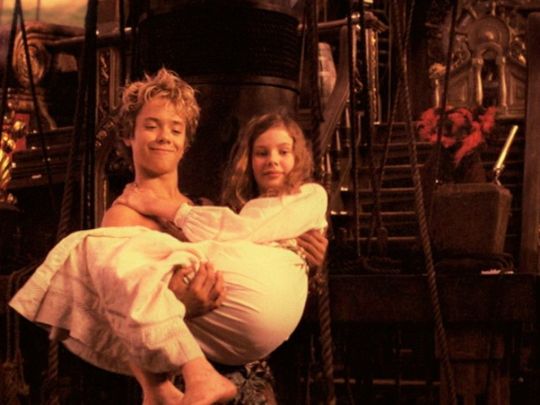
In most adaptations of Peter and Wendy, such as Hook and Syfy’s Neverland, the focus is on the title character Peter. In the more recent film adaptation Peter Pan and Wendy, the focus is on Wendy. This film adaptation of Peter and Wendy, on the other hand, sticks more closely to the original source material, as the story focuses on Peter and Wendy’s relationship. This is perhaps the reason why I always hesitate when I watch other adaptations, because these two characters are supposed to go together. It’s definitely a relationship that can be portrayed in all sorts of ways because they are symbolically the same person.
Although there is no romance between Peter and Wendy in either the original novel or the play, Wendy quickly develops romantic feelings for Peter which, as a prepubescent child, he does not consciously reciprocate as he has no concept of love other than that of a mother’s. Although Peter cares deeply for her, he ultimately only longs for her to be the maternal figure that is missing in his life. One could go into the symbolism that Peter and Wendy are one and the same, and that this is an expression of Wendy learning to love herself. But in a literal sense, J.M.Barrie had unintentionally created this very strong potential between the two characters. And I personally feel if your'e going to make an adaptation of Peter and Wendy that potential needs to be explored in some way, even if it’s not necessarily romantic.
Hogan recognised this potential and developed the romantic elements, e.g. ‘the “thimble” from the novel, into a very real and tangible plot. In other adaptations, Peter and Wendy’s relationship is rather one-sided. But in P.J. Hogan’s film adaptation, however, it is not at all. Over the course of the film, Peter and Wendy fall deeply in love with each other.
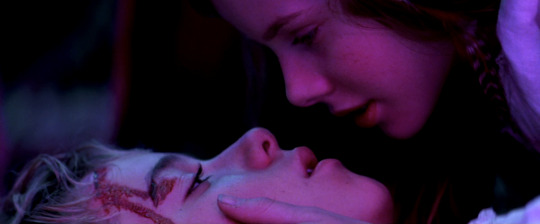
Rachel Hurd-Wood and Jeremy Sumpter had a remarkable on-screen chemistry for young actors, which helped give the adaptation its own identity. Whenever they interacted on screen as Peter and Wendy, it was — like the glittering pixie dust of Tinkerbell — simply magical. The off-screen chemistry between the two definitely helped make the romance so believable as well. When I was younger, I didn’t like romantic subplots in family films. I personally found that they clogged up the main plot because the “romance” tended to be very one-dimensional- but Peter and Wendy in the 2003 film version were simply enchanting.
In the original novel, J.M.Barrie alludes to the possibility of a romance between the two. In the film adaptation, they go all out. Their love story was written so beautifully and profoundly, while staying true to the original text and J.M.Barrie’s themes. This made the conflict hinted at in the novel of “staying in Neverland with Peter or growing up on Earth with Wendy” even more poignant and relevant, because in reality there was only ever one option. They couldn’t find a way to have both. That made the ending even more “heartbreaking” for me as a child, because even though they had the chance to be happy together, she couldn’t give up on growing up to stay. And he couldn’t give up being a child to leave, even though it was a natural progression for him.
Peter Pan
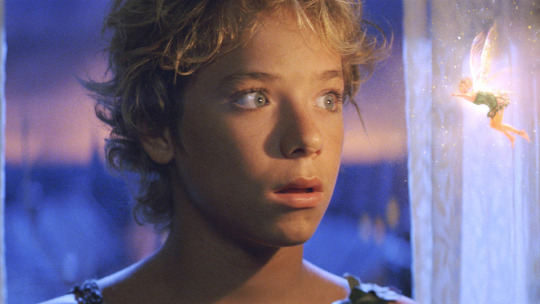
Jeremy Sumpter delivered a fantastic performance as Peter Pan. Not only did he perfectly match the illustrations, but he also managed to perfectly capture the essence of the charismatic, mischievous little boy from the novel. What’s more, of all the versions I have seen so far, he is by far the most accurate, right down to the clothes made of skeleton leaves, the dirty fingernails, the feral mannerisms, the traumatised soul behind the charm and the downright creepy insinuations. By today’s standards, you could almost take Peter Pan for a grown man who consciously decides not to behave like this.
However, when I watch the film again as an adult, I can now understand why he has reservations about growing up in Edwardian England and would rather remain a “child” in Neverland forever. As Peter says in the film, “Would they send me to school? And then to an office?” I feel like most of us today have so many choices as we get older, but back then it was much more limited. The choices were very restricted in that “heterosexist” environment. You could only be a certain thing, and it was much harder to hold on to the pleasures of life. I can now also understand the initial reactions of Michael and John to Peter: He must have seemed scandalous to people at the time. His bright colours, his inappropriate clothing and his behaviour are repulsive to the boys, but Wendy is immediately fascinated and attracted. I think it was a deliberate choice that he is the only character with an American accent to set him apart from the rest of the cast; to emphasise the wildness of the character and his non-conformity to the people of Edwardian London.
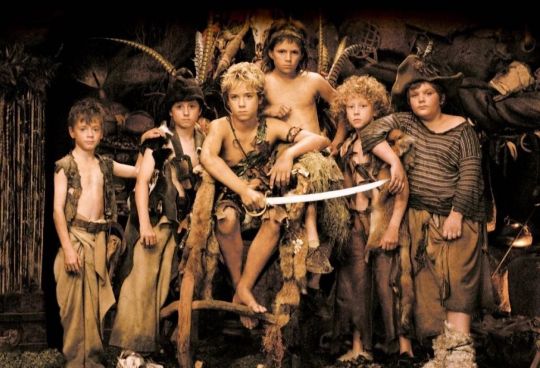
Another small aspect I liked was the suggestion that the Lost Boys, although they lived with Peter and obeyed his commands, lived in constant fear of him and did not worship him as in other adaptations. (A fear that is justified as Peter tries to kill them more than once in the film). What the 2003 film adaptation captured perfectly about Peter's character was: how terrible of a person he really is. Peter Pan is a hero when he goes on adventures and fights pirates. You could argue — via the quote “Leave Hook to me” (which Peter says to her in the film) — that Peter is Wendy’s split self who can fight her father (Captain Hook) for her, just like antibodies do with germs when we can’t handle them ourselves.
However, when it comes to understanding emotions, caring about others, even his henchmen, the Lost Boys, and doing anything that inconveniences him, Peter Pan is possibly as bad as Captain Hook. This makes Wendy’s decision to leave him all the more powerful. Although she was initially seduced by his adventurous life, she soon realises that his “life” of joy and adventure is not fulfilling at all. Because in reality, there is no real joy. There is no real adventure. In reality, his life is empty because it is not earned. In addition, she realises that she is gradually losing her memory of the outside world, including her parents - a sign that she is “slowly awakening from the dream”. This leads Wendy to realise that she wants more than what he can give her in Neverland (e.g. romantic love) and decides to leave. Being alive means feeling, accepting and growing. However, as long as Peter remains a boy, he can never truly be alive. Peter Pan conveyed this important message, whereas earlier film adaptations, including the Disney animation, did not.
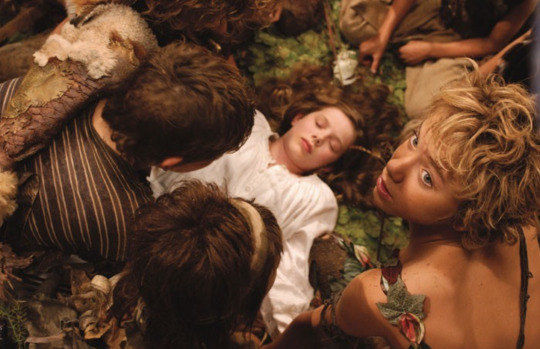
One of the reasons why good adaptations of Peter and Wendy are so hard to come by, especially in this day and age, is not only because they adapt a performative story that exists in layers of subtext. They also work with a protagonist who doesn’t change. Who doesn’t develop in any way, neither negatively nor positively. Not even just physically, but also mentally. (Even Eli from Let the Right One In, the child vampire, changes in the course of the story). At the end of day, Peter Pan is ultimately there to serve someone else’s story. It works in a fairy tale format. But it doesn’t usually translate very well to the screen because it often leads to one-dimensional storytelling. Even if it seems so natural, it doesn’t come naturally.
However, this adaptation allows Peter Pan to grow. The writers expanded on the small aspect from the book, which is the moment when Wendy enters Peter’s life; he begins to feel emotions. Not just love. But anger. Fear. Sadness. Pain. Disgust. And above all: self-awareness. Almost like a version of puberty in condensed time, as if the change suddenly caught up with his body. When Wendy brings this up, Peter immediately rejects it out of fear. I think most of us can all relate to this when we were in the midst of growing into a young adult. We experience feelings that are scary and new, that we can’t yet fully understand or even want to. For Peter Pan, falling in love is exactly what he is afraid of: growing up and no longer being a child. This adds to an interesting conflict that arises between the two when she asks him to leave with her.
“The thing about Peter Pan is, he’s a coward. Had the chance of a lifetime and he bottled it. Just fucked off back to Neverland. All alone, forever he was, by his own hand. Poor old Wendy, she had to grow old without him.” — Skins, 6x07 “Alo”
In the original novel, the reason Wendy can’t take Peter Pan with her (apart from the fact that he refuses to grow up) is the same reason Lyra in His Dark Materials can’t take Pan — the animal manifestation of her soul — on the boat to the land of the dead. She has to split in order to grow up and leave a part of herself behind. She can’t keep both in order to move on. But that does not mean I always agree with the ending either. In which Peter remains a child and takes Wendy’s future descendants to Neverland and back to look after him. It leaves an icky aftertaste, but at least it fits in with the story J.M. Barrie wanted to tell.

Even though the adaptation conveys the same message, that Peter Pan is the manifestation of Wendy’s youth, even to the end. In this version of Peter Pan, that is no longer the case. By the end of the film, the way he holds himself is different. The way he looks wistfully through the open window and solemnly says, “To live would be an awfully big adventure,” : a sign of self-awareness, while Wendy happily reunites with her family. So much so that Tinkerbell has to pull him by the hair to stop him from joining them and reconsidering his decision. Peter is now old enough to know that he loves Wendy. Maybe he’s also mature enough to know what he’s missing, but he knows he can’t have her the way he wants, so he does the most selfless thing he’s ever done in the whole film by letting her go.
There is no such conflict at the end of the 1953 Disney animated film. Peter Pan is described by Wendy as “wonderful”. In reality, everyone else gets their happy ending, except him, because he deliberately chooses not to. Peter Pan very much turns himself into a tragic figure because he is afraid of the most natural thing in the world. He is afraid of life. And I feel like this version of the story knew that and expressed it strongly, which makes me conflicted now as an adult. I’ve seen endings like this before, where two people fall in love but do not end up together because they grow apart or they are both interested in different things, and it’s very important to reach those points in different ways. It very much reflects real life and is also reminiscent of first love. How that love never really fades. It reminds you of simple times, even when you’ve grown up and moved on. That a part of you is still at that age when you look back on it. These endings happen because people grow — which Peter Pan does not.
“Peter in the books lives in oblivious tragedy. He may suspect that he’s not fully happy, but he tends to forget about it… yet this Peter doesn’t… Wendy leaving him and growing up to be a wife of another man is his unhappy thought…It’s the loss of innocence since Peter could not forget this…It’s the process of growing up…all but confirms that Peter’s character arc in the film is one of accepting the fact he too must grow up to be happy.” — @rex-shadao
And I think that’s the real reason why his character is both the strongest and the weakest part of the adaptation. The writers didn’t make it clear enough that Peter Pan forgets in their version of the character. In the novel, Peter Pan forgets everything automatically, which is why he can exist in this limbo of childhood and not go mad. However, as mentioned earlier, this version of Peter Pan is old enough to remember and, more importantly, to feel. Even though he is the closest to J.M. Barrie’s original vision, unlike his counterpart in the book, he is capable of evolving. That’s why the ending sometimes feels strange to me as an adult.
It was hard to say why I had a strange feeling at first, but I realised that a lot of my mixed feelings stemmed from having seen the film adaptation fresh after reading the novel. Since Peter Pan fully reciprocates Wendy’s love in this version, he ends up being a different character than in the book, which is why I now disagree with them keeping the original ending instead of having him grow up with Wendy. It would symbolise that childhood can co-exist with adulthood, that you don’t have to leave a part of yourself behind. That you can be your true and complete self if you find the balance between the two extremes.
The original ending still works however, in all its bittersweetness. I know what it means and understand what it stands for. Wendy basically says goodbye to her childhood and promises never to forget it. There’s a reason it made such an impression on me when I was younger. It could just be because I’m trying to pick up all the pieces of my broken heart from the floor. But personally, as an adult, I just find it weaker compared to the novel. Sometimes I like to imagine an ending to this version of the story where Peter Pan comes back, having quickly realised that he has outgrown Neverland, but doesn’t meet Wendy again until they are both much older, at a time when Wendy is coming to terms with womanhood and the idea of marriage. Or she even meets his real earth counterpart (if we were to delve into the psychology of Neverland being Wendy’s dream). And their relationship is subjected to the natural test of time and growth.
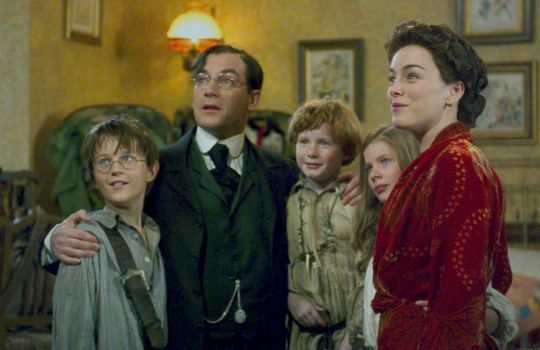
Peter Pan is an almost perfect adaptation. It matches the humour, the tone and the vision of J.M.Barrie. But I can certainly understand why the film didn’t do so well at the box office. In the month it was released, there was an unfair amount of competition, namely the film Lord of the Rings — The Return of the King. And as an adult, I can now understand why it’s not the film people think of or remember when it comes to Peter Pan adaptations. And it’s not just because it doesn’t fit the elfish, jolly trickster persona that Disney has created.
The film adaptation suffers more from what it doesn’t do — such as maintaining a stable tone and consistent editing — than from what it does. It’s one of those films that would have benefited from being much longer. And this is going off a point I've seen someone make in the past, that no Fantasy Film should be under two hours because of all the worldbuilding it has to introduce. That way, the inconsistent tone and some of the rushed parts of the adaptation would be much more balanced. It feels like it was missing an extra twenty minutes. For example, the film is narrated by an older version of Wendy, but without the deleted ending where it becomes properly clear that it’s her telling the story to tie everything together, the ending feels a little abrupt. Say what you will about Tim Burton’s adaptation of the Series of Unfortunate Events, but the audience could see where the film’s narration was coming from the whole time. I think if they knew the alternate ending wasn’t going to work (that scene is a classic example of something working well in the novel but not in the film), they should have removed the narrator altogether with the deleted ending and adjusted the film accordingly. They should have extended some scenes so that parts of the film weren’t rushed, such as the introduction, and the story would have been left more up to interpretation as there was no voiceover throughout.
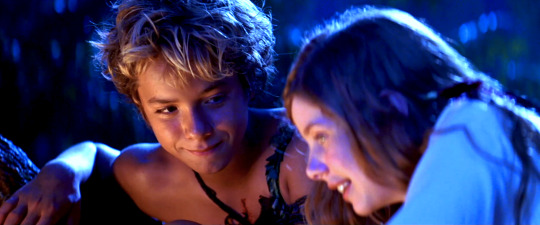
Despite its weaknesses, P.J.Hogan’s Peter Pan is still an underrated masterpiece 20 years later. It is an irresistible film that captivates and warms the heart. The film adaptation has certainly stood the test of time, staying true to the original while adding its own flavour to the story. It is full of magic, wonder and heart. It was clearly made by people who loved the origins of the story and explored where they came from, while also digging deep into the text to reshape the character arcs in a fresh and meaningful way. They succeed in capturing J.M.Barrie’s original message, which is that growing up is a natural progression of life, but that doesn’t mean leaving childhood behind entirely. That it is important to maintain a healthy balance between the two: Taking responsibility while appreciating the joys of life. From the vibrant colour palette to the goosebump-inducing music to the solid performances and gorgeous chemistry between Jeremy Sumpter and Rachel Hurd-Wood, my love for this adaptation will never end, no matter how old I am.
#peter pan#peter pan 2003#jason isaacs#jeremy sumpter#rachel hurd wood#peter and wendy#j.m barrie#peter x wendy#wendy darling#analysis#tinkerbell#captain hook#disney#peter pan and wendy#disney +#hook#James Newton Howard#olivia williams#novel#classic literature#filmmaking#film#cinema#culture#movie review#darling pan#finding neverland#film review#peter pan (2003)#peter pan live action
457 notes
·
View notes
Text
81 Democrats have voted for the NDAA bill, which has an anti-trans amendment pulling care from trans youth enrolled in TriCare
The NDAA, aka the National Defense Authorization Act, is a set of laws and provisions that set up the annual budget for the Department of Defense.
However, the Bill included a provision that would strip Trans service members and trans family members of service members in addition to another provision that will now limit diversity, equity and inclusion (DEI) programs in the military
Unfortunately, the bill passed 281-140 through the house with 81 democrats voting in favor
Here's a list of the Dems who voted yes:
From the state of Alabama
Sewell (Democrat) votes Yea
From the state of Alaska
Peltola (Democrat) votes Yea
From the state of Arizona
Gallego (Democrat) votes Yea
Stanton (Democrat) votes Yea
From the state of California
Aguilar (Democrat) votes Yea
Carbajal (Democrat) votes Yea
Costa (Democrat) votes Yea
Eshoo (Democrat) votes Yea
Harder (Democrat) votes Yea
Levin (Democrat) votes Yea
Lieu (Democrat) votes Yea
Lofgren (Democrat) votes Yea
Panetta (Democrat) votes Yea
Peters (Democrat) votes Yea
Ruiz (Democrat) votes Yea
Thompson (Democrat) votes Yea
Torres (Democrat) votes Yea
From the state of Colorado
Caraveo (Democrat) votes Yea
Crow (Democrat) votes Yea
From the state of Connecticut
Courtney (Democrat) votes Yea
DeLauro (Democrat) votes Yea
Hayes (Democrat) votes Yea
Himes (Democrat) votes Yea
From the state of Florida
Castor (Democrat) votes Yea
Cherfilus-McCormick (Democrat) votes Yea
Frankel, Lois (Democrat) votes Yea
Moskowitz (Democrat) votes Yea
Soto (Democrat) votes Yea
Wilson (Democrat) votes Yea
From the state of Georgia
Bishop (Democrat) votes Yea
McBath (Democrat) votes Yea
From the state of Hawaii
Case (Democrat) votes Yea
From the state of Illinois
Budzinski (Democrat) votes Yea
From the state of Indiana
Mrvan (Democrat) votes Yea
From the state of Maine
Golden (Democrat) votes Yea
From the state of Maryland
Hoyer (Democrat) votes Yea
Ivey (Democrat) votes Yea
Mfume (Democrat) votes Yea
Ruppersberger (Democrat) votes Yea
Trone (Democrat) votes Yea
From the state of Michigan
Scholten (Democrat) votes Yea
Slotkin (Democrat) votes Yea
Thanedar (Democrat) votes Yea
From the state of Minnesota
Phillips (Democrat) votes Yea
From the state of Mississippi
Thompson (Democrat) votes Yea
From the state of Nevada
Horsford (Democrat) votes Yea
Lee (Democrat) votes Yea
From the state of New Hampshire
Pappas (Democrat) votes Yea
From the state of New Jersey
Gottheimer (Democrat) votes Yea
Sherrill (Democrat) votes Yea
From the state of New Mexico
Vasquez (Democrat) votes Yea
From the state of New York
Jeffries (Democrat) votes Yea
Kennedy (Democrat) votes Yea
Meeks (Democrat) votes Yea
Morelle (Democrat) votes Yea
Ryan (Democrat) votes Yea
Suozzi (Democrat) votes Yea
Tonko (Democrat) votes Yea
From the state of North Carolina
Davis (Democrat) votes Yea
Jackson (Democrat) votes Yea
Manning (Democrat) votes Yea
Nickel (Democrat) votes Yea
From the state of Ohio
Kaptur (Democrat) votes Yea
Landsman (Democrat) votes Yea
Sykes (Democrat) votes Yea
From the state of Pennsylvania
Cartwright (Democrat) votes Yea
Dean (Democrat) votes Yea
Houlahan (Democrat) votes Yea
Wild (Democrat) votes Yea
From the state of Rhode Island
Magaziner (Democrat) votes Yea
From the state of South Carolina
Clyburn (Democrat) votes Yea
From the state of Texas
Allred (Democrat) votes Yea
Cuellar (Democrat) votes Yea
Escobar (Democrat) votes Yea
Gonzalez, V. (Democrat) votes Yea
From the state of Virginia
McClellan (Democrat) votes Yea
Scott (Democrat) votes Yea
From the state of Washington
Larsen (Democrat) votes Yea
Perez (Democrat) votes Yea
Schrier (Democrat) votes Yea
Strickland (Democrat) votes Yea
If you see your representative on this list, I suggest that you call them and share your disappointment for passing a bill that targets trans youth and trans adult.
#censorship#ngo#nonprofits#nonprofit#aclu#american civil liberties union#civil society#civil rights#fuck trump#stop project 2025#we will not go back#donotobey#do not obey in advance#resistance#resist#fuck elon musk#keep fighting#keep going#stand and fight#senate#usa news#us politics#contact your senators#raiseawareness#senators#kosa#fuck kosa#stop kosa#bad internet bills#owl house
44 notes
·
View notes
Text
The Hot Shots Roster
Hey, everyone! As mentioned, here's the list of the Round One competitors that are vying for the title of the hottest vintage album cover:
AC/DC - High Voltage (European alternate cover)
Anita Ward - Songs of Love
Aretha Franklin - Almighty Fire
Aretha Franklin - La Diva
Aretha Franklin - With Everything I Feel in Me
Art Blakey - The Freedom Rider
Art Van Damme Quintet - Martini Time
Ashford and Simpson - Is It Still Good to Ya
Barbra Streisand - Classic Barbra
Barbra Streisand - Wet
Bee Gees - Main Course
Bee Gees - Spirits Having Flown
Belchior - Todos os Sentidos
Betty Davis - Nasty Gal
Billy Joel - 52nd Street
Billy Joel - The Stranger
Billy Preston - Live European Tour
Bionic Boogie - Tiger Tiger
Blondie - Parallel Lines
Blossom Dearie - Blossom Dearie
Blue Oyster Cult - Blue Oyster Cult
Blue Oyster Cult - Tyranny and Mutation
Bob Dylan and The Band - Before the Flood
Bob Dylan - Blonde on Blonde
Bob Dylan - Highway 61 Revisited
Bob Dylan - The Freewheelin' Bob Dylan
Bob Thompson, His Chorus, and Orchestra - On the Rocks
Bobbie Gentry - Fancy
Boney M - Love for Sale
Boney M - Take the Heat off Me
Breakwater - Breakwater
Bruce Springsteen - Born to Run
Bruce Springsteen - Darkness on the Edge of Town
Bruce Springsteen - The Wild, the Innocent, and the E Street Shuffle
Caetano Veloso - Araca Azul
Carly Simon - Boys in the Trees
Carly Simon - Playing Possum
Carmen Maki - Poems in the Midnight
Carole King - Tapestry
Carole King - Thoroughbred
Chaka Khan - Chaka
Cher - Backstage
Cher - Dark Lady
Cher - Half-Breed
Cher - Prisoner
Cher - Take Me Home
Chic - Chic
Claudio Baglioni - E tu...
Claudio Tellino - Calamo
Cockney Rebel - Love's a Prima Donna
Cockney Rebel - The Human Menagerie
Contortions - Buy
Cream - Disraeli Gears
Crosby, Stills, and Nash - CSN
Crystal Gaye - We Should Be Together
Curtis Mayfield - Do It All Night
Curtis Mayfield - Give, Get, Take, and Have
Dalida - Elle S'appelle Dalida
David Bowie - Aladdin Sane
David Bowie - The Man Who Sold the World
David Bowie - The Rise and Fall of Ziggy Stardust
Deep Purple - Fireball
Deep Purple - Stormbringer
Deep Purple - The Book of Taliesyn
Della Reese - Moody
Dexter Gordon - Our Man in Paris
Diana Ross and Marvin Gaye - Diana and Marvin
Diana Ross - Baby It's Me
Diana Ross - Everything Is Everything
Diana Ross - Ross
Diana Ross - The Boss
Dionne Warwick - The Sensitive Sound of Dionne Warwick
Dolly Parton - Heartbreaker
Dolly Parton - Here You Come Again
Dolly Parton - My Blue Ridge Mountain Boy
Don McLean - Tapestry
Donna Summer - Bad Girls
Donna Summer - Four Seasons of Love
Donna Summer - Live and More
Donna Summer - Love to Love You Baby
Donna Summer - Once Upon a Time
Eartha Kitt - Down to Eartha
Eddie Rabbitt - Loveline
Eddie Rabbitt - Variations
Elton John - Captain Fantastic and the Brown Dirt Cowboy
Elton John - Friends
Elvis Presley - Clambake
Emmylou Harris - Elite Hotel
Emmylou Harris - Luxury Liner
Eric Clapton - Backless
Fausto Papetti - 2a Raccolta
Fausto Papetti - La Playa
Fleetwood Mac - Rumours
Four Tops - On Broadway
Foxy - Get Off
Francesco de Gregori - Bufalo Bill
Frank Zappa - Apostrophe
Freddie Hubbard - Hub-Tones
Gal Costa - India
Gary Numan - The Pleasure Principle
Genevieve Waite - Romance Is on the Rise
George Martin - Live and Let Die
Gil Scott-Heron and Brian Jackson - Winter in America
Gina X Performance - Nice Mover
Grace Jones - Portfolio
Harry Belafonte - An Evening With Belafonte
Heart - Dreamboat Annie
Heidi Bruehl - Verliebt wie du und ich
Herb Alpert - Whipped Cream and Other Delights
Iggy Pop - New Values
Ivano Fossati - Good-bye Indiana
Janis Ian - Between the Lines
Janis Joplin - Janis Joplin's Greatest Hits
Jards Macale - Contrastes
Jeff Beck - Blow By Blow
Jim Post - I Love My Life
Jimi Hendrix - Crash Landing
Jimi Hendrix - Electric Ladyland
Jimi Hendrix - Loose Ends
Jimi Hendrix - The Cry of Love
Joan Armatrading - To the Limit
John Barry - You Only Live Twice
Johnny Cash - Orange Blossom Special
Johnny Mathis - Killing Me Softly With Her Song
Judas Priest - Sad Wings of Destiny
Juliane Werding - Ein Schritt weiter
Julie London - About the Blues
Julie London - Julie
Julie London - London by Night
Julie London - Whatever Julie Wants
Jun Fukamachi - Second Phase
Katja Ebstein - Mein Leben ist wie ein Lied
Kenny Burrell - Blue Lights
Kiki Dee - Stay With Me
King Crimson - In the Court of the Crimson King
Kool and the Gang - Spirit of the Boogie
Kumiko Hara - No Smoking
Leslie First and Combo - Sexy Hammond
Linda Ronstadt - Hasten Down the Wind
Linda Ronstadt - Heart Like a Wheel
Linda Ronstadt - Simple Dreams
Lizzy Mercier Descloux - Press Color
Loretta Lynn - Blue Kentucky Girl
Lou Reed - Coney Island Baby
Lou Reed - Rock n Roll Animal
Lou Reed - Take No Prisoners
Louis Moholo Octet - Spirits Rejoice!
Love - Forever Changes
Maria Bethania - Alibi
Marianne Faithfull - Broken English
Mark-Almond - Other People's Rooms
Martha Miyake - Together With Jun
Martin Denny - Quiet Village
Marvin Gaye - I Want You
Marvin Gaye - Live at the London Palladium
Marvin Gaye - What's Going On
Marvin Gaye - When I'm Alone I Cry
Mick Ronson - Slaughter on 10th Avenue
Miles Davis - 'Round About Midnight
Mina - Mina 2
Momoe Yamaguchi - Dramatic
Mott the Hoople - The Hoople
Musique - Keep on Jumpin'
Nanako Sato - Kissing Fish
Nelson Riddle - Sea of Dreams
New York Dolls - New York Dolls
Nick Drake - Bryter Layter
Nico - Desertshore
Nino Oliviero - La Moglie Giapponese
Nukhet Duru - Bir Nefes Gibi
Ohio Players - Ecstasy
Ohio Players - Fire
Olivia Newton-John - Totally Hot
Ornella Vanoni - Uomo Mio, Bambino Mio
Osanna - Suddance
Parliament - Mothership Connection
Patti Smith - Easter
Patti Smith - Horses
Pearl Bailey - Sings for Adults Only
Peggy Lee - The Man I Love
Peter Straker - Changeling
Phyllis Hyman - You Know How to Love Me
Pink Floyd - Animals
Pink Floyd - Dark Side of the Moon
Pink Floyd - Wish You Were Here
Prince - Prince
Pucho and his Latin Soul Brothers - Yaina
Queen - News of the World
Queen - Sheer Heart Attack
Ramones - Ramones
Ray Charles - The Great Ray Charles
Ray Conniff - Say It With Music
Rie Nakahara - Touch Me
Rod Stewart - Blondes Have More Fun
Roxy Music - For Your Pleasure
Roxy Music - Stranded
Ruth Copeland - Take Me to Baltimore
Scorpions - In Trance
Shirley Bassey - Something Else
Sonny Clark - Cool Struttin'
Sonny Rollins - Work Time
Sparks - Propaganda
Strapps - Strapps
Styx - Best of Styx
Styx - Man of Miracles
Su Kramer - Die zwei Gesichter
Sun - Wanna Make Love
Susan Cadogan - Doing It Her Way
Suzi Lane - Ooh La La
Suzi Quatro - Suzi Quatro
Suzi Quatro - Suzi...and Other Four Letter Words
Suzi Quatro - Your Mama Won't Like Me
T. Rex - T. Rex
T. Rex - A Beard of Stars
T. Rex - Electric Warrior
T. Rex - My People Were Fair...
T. Rex - Tanx
The Beatles - Abbey Road
The Beatles - Revolver
The Beatles - With The Beatles
The Cars - Candy-O
The Clash - London Calling
The Doors - The Doors
The Doors - Waiting for the Sun
The Dubliners - A Drop of the Hard Stuff
The George Shearing Quintet - Mood Latino
The Kinks - Low Budget
The Kinks - Percy
The Rolling Stones - Sticky Fingers
The Stooges - Raw Power
The Supremes - High Energy
The Velvet Underground - 1969: Live
The Velvet Underground - Andy Warhol's Velvet Underground ft. Nico
The Velvet Underground - Loaded
The Velvet Underground - Squeeze
Thin Lizzy - Fighting
Thin Lizzy - Nightlife
Thin Lizzy - Thin Lizzy
Tim Buckley - Tim Buckley
Tim Curry - Fearless
Tina Turner - Acid Queen
Tom Jones - The Body and Soul of Tom Jones
Tom Jones - Tom
Tom Petty and the Heartbreakers - Tom Petty and the Heartbreakers
Tom Waits - Blue Valentine
Tom Zacharias - Belindas Doettrar
Toto - Hydra
Townes Van Zandt - Townes Van Zandt
Tubeway Army - Replicas
Van Halen - Van Halen
Vicky Leandros - Ich liebe das Leben
Wally Tax - Love In
Warren Zevon - Excitable Boy
Waylon Jennings - Hangin' On
Wild Cherry - Wild Cherry
Zafer Dilek - Oyun Havalari
#hot shots album cover tourney#btw i didn't forget all the umlauts and accents and stuff in the actual post#don't worry#i'm just typing this out and copying what my image file names are
18 notes
·
View notes